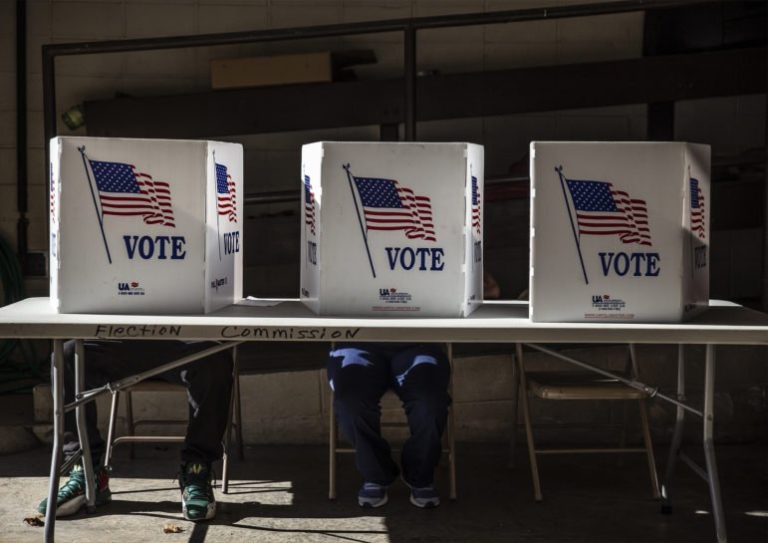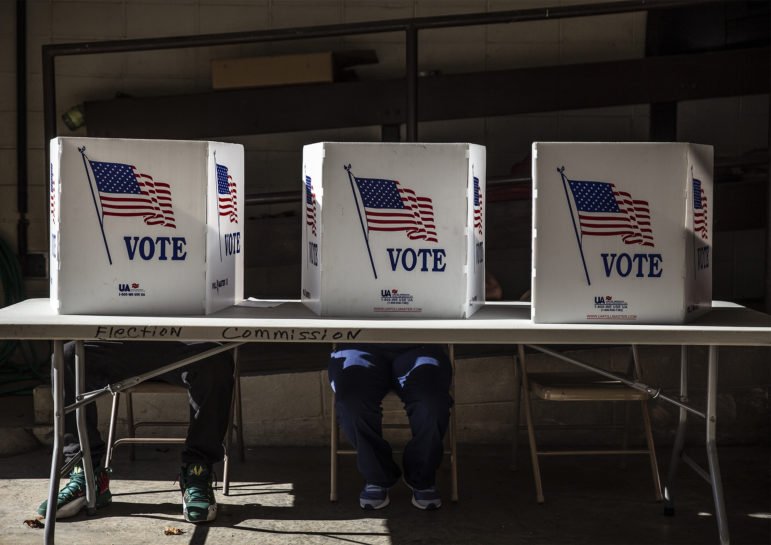

Eric J. Shelton, Mississippi Today/ Report for America
Voters cast their votes at Jackson Fire Station #22 during the midterm elections Tuesday, November 6, 2018.
In the coming days, the Legislature most likely will take up bills to restore the right to vote to felons – one felon at a time.
It is a strange process – a holdover from the 1890s’ racially charged Mississippi Constitution – that gives the Legislature the authority to restore voting rights. But it is done on a case-by-case basis. It takes a bill for each person whose rights are restored.
Often the felons getting their rights restored are those who have some type of political connection or the wherewithal to navigate the maze that is the legislative process.

Bobby Harrison
For instance, in 2019 the Legislature restored voting rights to Patrick Joseph Fick of Harrison County, who was convicted of crimes almost 30 years ago. Fortunately, Fick’s friend was a relative of state Rep. Richard Bennett, R-Long Beach, who agreed to file the bill restoring his rights. If Fick did not have connections to Bennett, he said in a 2019 interview he would not have known about the legislative process to restore voting rights.
Late last week House Judiciary B passed eight bills out of committee to restore the right to vote to felons who have paid their societal debt.
“Hopefully we can get them (bills restoring voting rights) all the way through the process,” said Judiciary B Chair Nick Bain, R-Corinth.
In the coming days, it is likely that Senate Judiciary B Chair Brice Wiggins, R-Pascagoula, also will be working on suffrage bills.
The Legislature has averaged passing 7.4 suffrage bills per year since 2000 with a high of 34 in 2004. In three years since 2000, legislators did not pass any. They passed 16 last year – the second most since 2000.
There are currently two efforts – one by the Mississippi Center for Justice and another by the Southern Poverty Law Center – to get federal courts to declare unconstitutional the portion of the state Constitution that permanently disenfranchises some felons.
The 5th U.S. Circuit Court of Appeals had scheduled oral arguments later this month in the case brought by the Center for Justice. But now the court is contemplating whether to just consider written briefs.
Rob McDuff of the Mississippi Center for Justice said it is clear that when the framers of the state Constitution developed the felony disenfranchisement program that they had “racial intent.” The lawsuit said the program was designed to deny the vote to African Americans just like the poll tax, literacy test and other elements of the state Constitution that already have been struck down by federal courts.
In the 1890s, the Mississippi Supreme Court said the disfranchisement of felons was placed in the Constitution “to obstruct the exercise of the franchise by the negro race” by targeting “the offenses to which its weaker members were prone.”
Those crimes placed in the Constitution where conviction would cost a person the right to vote were bribery, theft, arson, obtaining money or goods under false pretense, perjury, forgery, embezzlement, bigamy and burglary. Those were crimes, rightfully or wrongfully, that the framers believed African Americans were more likely to commit.
It should be noted that under the original language of the Constitution a person could be convicted of cattle rustling and lose the right to vote, but convicted of a murder or rape and still be able to vote – even while incarcerated.
In 1968, the crimes of murder and rape were added as disenfranchising crimes. But even today, a person could be convicted of writing a bad check and lose the right to vote, but be a major drug kingpin locked up in prison and still vote.
Early in one of its court filings, the Attorney General’s office in defending the process said “like most states, Mississippi law has always disenfranchised felons one way or another.”
But in truth Mississippi is not like other states. Mississippi is among a handful of states – about 10 according to the Sentencing Project – that do not restore the right to vote at some point after a person completes his or her sentence, which could include finishing terms of probation and parole.
A 2016 study by the Sentencing Project, a national research and advocacy group that works on criminal justice issues, found that nearly 10 percent of Mississippi’s population is disenfranchised – trailing at the time only Florida. In 2018, Floridians voted to change their law to automatically restore the right to vote.
In the meantime, the Mississippi Legislature might take up one bill at a time to restore the right to vote to a handful of people in the coming days. But there has been no serious consideration by the Legislature of Mississippi joining other states on the issue since the early 2000s when the Democratic House made efforts to put in place a way to automatically restore voting rights.
The post Lawsuits attempt to put Mississippi in mainstream on felony voting, Legislature avoids issue appeared first on Mississippi Today.
- Rising optimism among small and middle market business leaders suggests growth for Jackson - February 24, 2026
- Jackson City Council confirms mayor’s pick of RaShall Brackney as new police chief - February 24, 2026
- Hinds County supervisors bemoan demands on purse strings as public defenders seek better pay - February 24, 2026